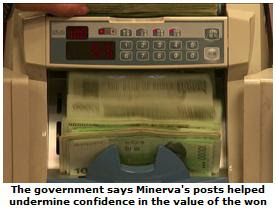The Minerva case
Soothsayer' blogger feels the heat
Professor Chin Jun Kwan smiles at the idea.
"He was called 'the president' on the internet," he recalls.
A left-wing academic who has long railed at South Korean governments of all stripes, Chin relishes the success, however fleeting, of another anti-establishment figure.
The 'presidency' of Park Dae-sung was indeed something to behold.
An unemployed, self-taught financial soothsayer, armed with little more than an internet account and a pile of text books, had, as the credit crunch took hold last year, risen to extraordinary prominence in this internet-obsessed country.
Writing as Minerva (he named his online alter-ego for the Roman goddess of wisdom), Park accurately predicted the fall of the US investment bank Lehmann Brothers, and collapse in the value of the South Korean currency, the won.
Woven into the economics was a caustic dose of politics – scathing criticism of President Lee Myun-bak and his administration's handling of the crisis.
Then in late December, as far as the authorities were concerned, he overstepped the mark.
Minerva wrote that the government had instructed banks not to buy US dollars in an effort to shore up the won.
Prosecutors say this was false, and cost the country $2bn as it tried to stabilise a currency market Minerva had sent into spasms.
He was arrested on January 7, and charged under a little-used communications law.
His lawyer, a former National Assembly member Park Chan-jong, transmits utter confidence that no court will convict him.
"In general people don't think that this is a crime," he says. "The government is stretching the laws to prosecute Minerva."
Chill wind
Eventual conviction or no, the simple fact of Minerva's arrest is having an effect.
His fan, Professor Chin, says a chill wind of fear is blowing through South Korea's enviable broadband network, and once outspoken bloggers are now censoring themselves.
"In this age," he says, "you can't know if you've committed a crime until the prosecutors or police call you up and tell you."
Industry insiders say they see a trend. One from a leading internet portal says since the arrest political posts are declining in number, while those on subjects such as entertainment news are on the climb.
And some South Korean 'netizens' are even backdating their fears – removing posts they think might attract unwanted attention.
"After Minerva's arrest I realised there was a possibility that the government could track me down and prosecute me," says Peter (not his real name).
"I wrote those posts not for any gain, politically or economically. I just wrote them to express my opinion."
Fears
Such fears may well be overblown, but they are genuine.
Peter says internet forums are buzzing with advice from poster to poster, often suggesting that passages be removed for the author's safety.
A succession of government departments declined to comment to us on the issue. But a recent statement from the chief prosecutor's office, detailing its actions in the Minerva case, acknowledged the row stirred up by the arrest.
It said in the future prosecutors would continue to defend the right to free speech, and leave well alone in cases where bloggers were writing opinion and analysis, be the facts right or wrong.
But it went on: "Those who spread falsehood with the intent of hurting public interest will be strictly dealt with."
The Minerva case could be a one-off. An embarrassing story for an administration made over-sensitive by a stalling economy and still bearing the scars of three months of internet-enabled anti-government street protests last year.
Nevertheless the impression at least, that there is a crackdown underway on South Korea's virtual world, remains all too real.

Comments